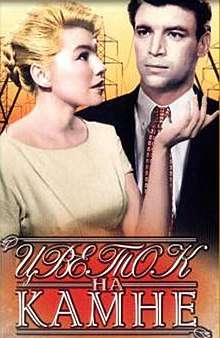Flower on the Stone
Flower on the Stone (Russian: Цветок на камне, romanized: Tsvetok na kamne) is a Soviet 1962 drama film directed by Anatoly Slesarenko and Sergei Parajanov.[1]
| Flower on the Stone | |
|---|---|
 | |
| Directed by | Anatoly Slesarenko Sergei Parajanov |
| Written by | Vadim Sobko |
| Starring | Inna Burduchenko Boris Dmokhovsky |
| Music by | Ihor Shamo |
| Cinematography | Aleksei Prokolenko |
| Edited by | M. Ponomarenko |
Production company | |
Release date | 1962 |
Running time | 76 minutes |
| Country | Soviet Union |
| Language | Russian |
The film premiere took place on 1 September 1962 in Kiev. The regular cinema screenings began on January 24, 1963. The film had a total of 5.2 million viewers.[2][3]
Plot
In place of the Donetsk steppe, overgrown with chamomile and feather grass, a mining town is being developed. Brigadier of the youth mine Grigory Griva is in love with comrade Lyuda and therefore often openly sneers at her organizational skills. But when he is alone with her, he becomes timid and shy, for which he is angry with himself and makes up new pranks.
The second story is connected with the appearance of Christina in the mining town, a beautiful but closed-minded girl who falls under the influence of the presbyter of the sect. Komsomol member Arsen who has fallen in love with the girl helps her leave the sect.
Cast
- Grigory Karpov – Grigory Griva, sinker
- Lyudmila Cherepanova – Lyuda, the Komsomol of the mine
- Inna Burduchenko – Christina, sectarian
- Boris Dmokhovsky – Pavel Fedorovich Varchenko, the head of the mine
- Georgy Epifantsev – Arsen Zagorny
- Mikhail Nazvanov – Zabroda, the librarian
- Dmitry Franko – Pasha Chmykh
- Vladimir Belokurov – father of Christina
- Alexander Gai – father of Lyuda
- Anatoly Soloviev – Peter the Great
- Boryslav Brondukov – Kovalyov
Production
Because of lack of safety on the set actress Inna Burduchenko died during the filming. She initially became famous for playing the main role in the religious drama Ivanna. The director of the film Anatoly Slesarenko was prosecuted for this and convicted. Sergei Paradzhanov completed the work on the film and gave it a new title (the original one was Thus Nobody Loved).[4][5]
References
- "Энциклопедия кино — Цветок на камне". dic.academic.ru.
- James Steffen (2013). The Cinema of Sergei Parajanov. University of Wisconsin Pres. pp. 42, 50, 51, 54, 256. ISBN 0-299-29653-9.
- "Цветок на камне". Kinopoisk.
- Veronika Nikitina. "6 популярных актеров, жизнь которых оборвалась на пике популярности". Rossiyskaya Gazeta.
- Lyubov Hazan. "35 лет назад, 28 декабря, ушёл из жизни антигерой, чья смелость восхищала многих диссидентов". Bulvar Gordona.